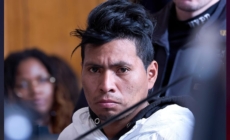-
Massive NBA Trade Proposal: Magic Land $29M Star to Bolster Playoff Chances - 16 mins ago
-
OpenAI’s ChatGPT is hit with outages. Here’s what to know. - 24 mins ago
-
Woman dies after being set on fire in New York City subway in ‘heinous crime’ - 28 mins ago
-
2024 NFL Week 17 Pick ‘Em: Predictions for FOX Super 6 by Chris ‘The Bear’ Fallica - 43 mins ago
-
Firefighters battle blaze, help homeless people evacuate vacant 4-story building in downtown L.A. - 46 mins ago
-
Police ‘Mystified’ After Woman Doused With Gas, Set Ablaze on Walk to Store - 55 mins ago
-
U.S. official says early indications Azerbaijan plane was hit by Russia - about 1 hour ago
-
Times investigation: Shocking murders, lingering doubts in a California mountain town - about 1 hour ago
-
Incredible. Fantastic. Tremendous. The College Football Playoff belongs on campus - about 1 hour ago
-
‘Baby Driver’ actor Hudson Meek dead at 16 after falling from moving vehicle - about 1 hour ago
Over 18,000 sign up for Supreme Court seats and federal judgeships in Mexico
Over 18,000 people have registered online to run for Supreme Court seats and federal judgeships in Mexico’s contentious new selection process, officials said Monday. But a random drawing in the end will determine who gets on the ballot.
The ruling party pushed through a constitutional reform in September to make all federal judges stand for election, replacing the system where court employees and lawyers mainly move up through the ranks.
Current court employees and their supporters have staged dozens of demonstrations against the reforms, calling them part of a ruling-party campaign to weaken checks and balances and eliminate independent regulatory and oversight bodies.
Now, candidates for Supreme Court seats and federal judgeships need only a law degree, a grade point average of 3.2, “five years of professional experience” and five letters of recommendation from neighbors or friends. That, and some luck in the final drawing.
Officials rejected criticism that has called the process rushed or amateurish for the often highly technical posts that can hear cases including intellectual property, organized crime and Constitutional law.
“The results have been spectacular,” said Arturo Zaldivar, a top adviser to President Claudia Sheinbaum.
According to the plan, evaluation committees will have just over a month to review thousands of resumes and whittle the field to about 10 candidates or less for each of the 881 judgeships and nine seats on the Supreme Court.
Then 1,793 names chosen at random from those selected will appear on the ballot on June 1.
Critics warn that many who land on the ballot will be unknowns who perhaps have never argued a case in the courts they seek to run.
“You don’t elect a doctor or a surgeon for an operation based on their popularity, you elect them based on their technical expertise, their ability, their knowledge,” said Sergio Méndez Silva, the legal coordinator for the civic group Foundation for Justice. “That also applies for a judge.”
With candidates now having to run election campaigns, critics warn there’s a chance that drug cartels or political parties could finance them to get friendly judges onto the bench.
There are also concerns that the evaluation committees deciding who makes the cut for the selection to appear on ballots may not be impartial. Most committee members were appointed by the legislative or executive branches, controlled by the ruling Morena party.
Some critics argue that the current justice system, which is riddled with nepotism, corruption and a lack of accountability, needs to be changed.
“We need a justice system that gives results,” said Minerva Martínez Garza, an academic and former head of the human rights commission in the northern border state of Nuevo Leon who has registered to run for a Supreme Court seat.
Trials in Mexico can last for years, and the ruling party has added to the growing list of crimes for which bail is not allowed, meaning that a large percentage of the prison population is people awaiting trial.
Source link






























